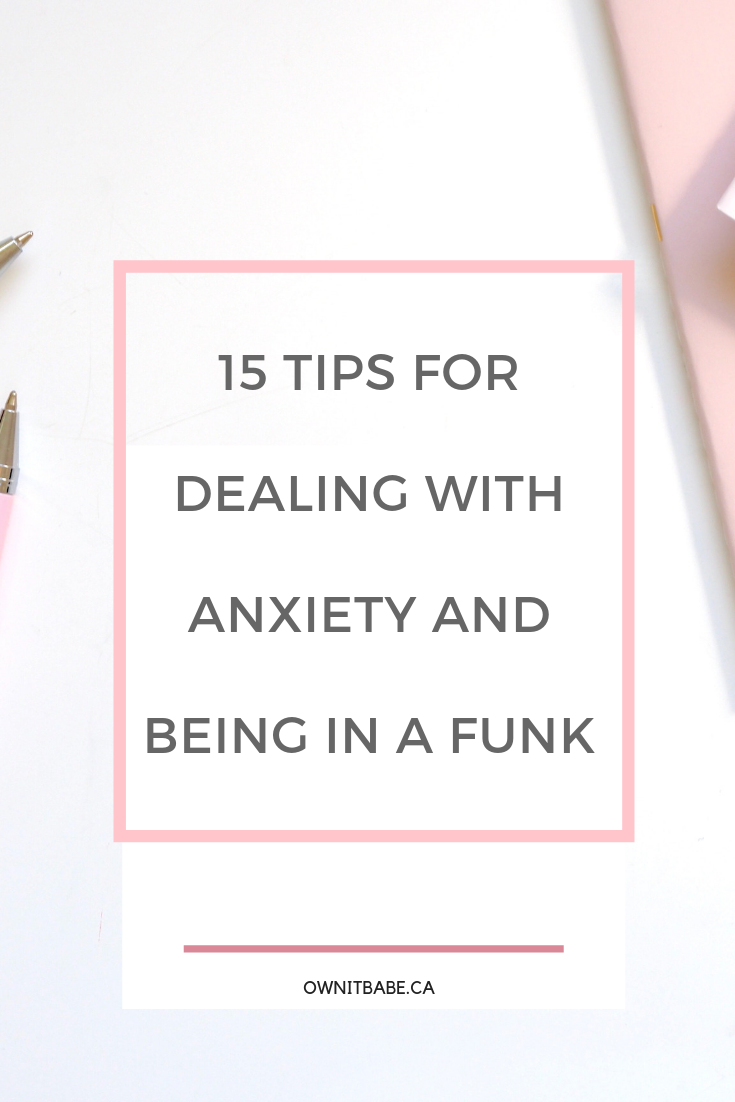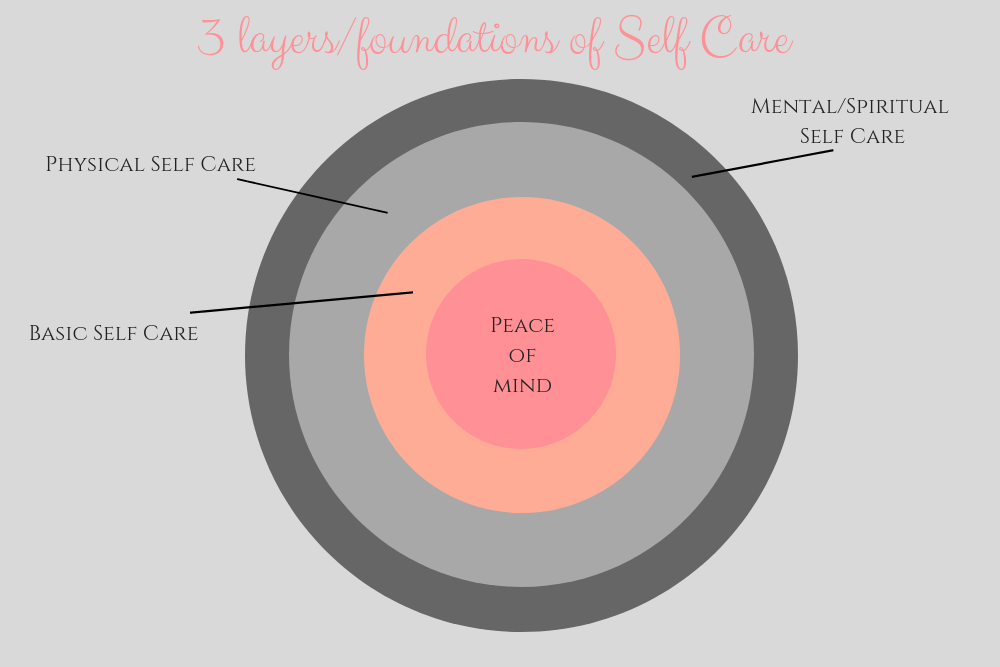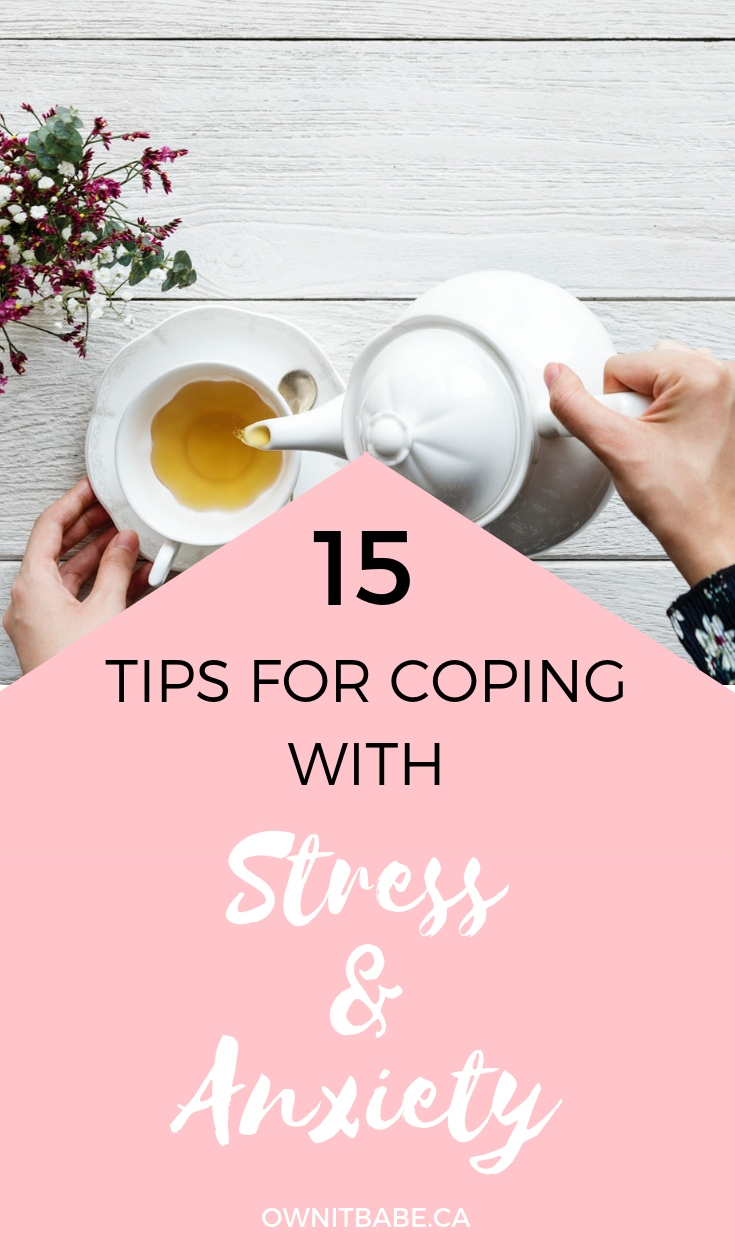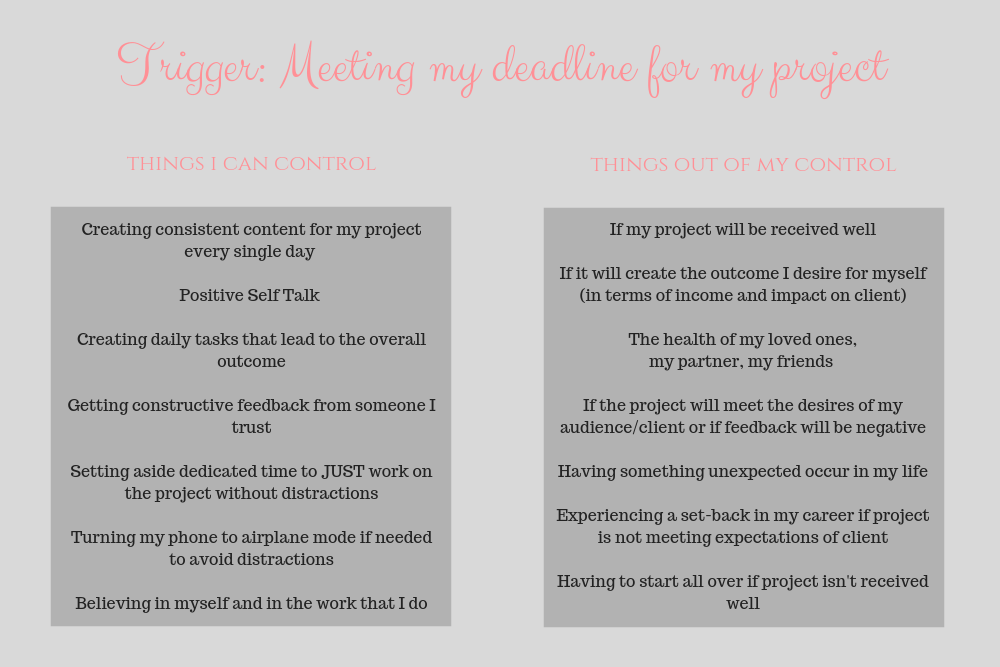15 Tips for coping with stress and anxiety – how to get out of the “funk-state” and calm your body and mind

If you have ever struggled with anxiety before, you know that stress can trigger anxiety episodes big time. I can see my anxiety from miles away: My mind starts spinning and I feel as if I am unable to stop thinking the same thoughts over an over and over again.
It can be crippling.
Over the past couple of years, I have found ways to take care of myself and manage my anxiety triggers as best I can. These coping mechanisms aren’t a fool-proof guarantee, but they do help me most times.
In this article, I am going to share 15 tips and tools that help me cope and calm myself down, before things feel “out of control”.
You will learn:
– How you can build your coping mechanism toolbox with a variety of tools to help you on tough days
– Why emotional eating is a life-saver sometimes and how to not demonize it as a coping mechanism
– How to use your free Mental Health Check List to keep track of your mental health
in a helpful and actionable way
Why humans use coping mechanisms and why they help us survive
Coping with difficult situations is human nature. We process emotions by using coping mechanisms, sometimes consciously, sometimes unconsciously. It is our body’s way of allowing us to survive challenges in life.
There’s countless ways humans cope with stress and anxiety and it’s important to not vilify the way we choose to cope. Feeling bad for coping with food for example, adds a lot of stress and anxiety on top of everything else, which causes us to self-sabotage.
Instead, wouldn’t it be so much more soothing to let our coping mechanisms comfort us? Let’s talk about how to go about this.
Why emotional eating isn’t your enemy
Emotional eating gets demonized in our society. We are taught that it is a bad thing to eat food when we need comfort. The result of this is that we feel isolated, ashamed and guilty when we gravitate towards food for comfort.
In my case, it resulted in 2 things:
1.I felt even more stressed and anxious, because my guilt added an extra layer of anxiety and shame on top of what I was already going through.
2.This perpetuated the cycle of ALWAYS going to food for comfort as a way to punish myself for feeling anxious.
It was very counter-productive and caused me to never actually taste the food I was consuming when feeling anxious. I would shovel it in my mouth as quickly as possible, before anyone could find out.
Not a very comforting and relaxing way to calm myself down, I tell ya.
I want to change the narrative around emotional eating. In my case, it has saved me from engaging in other, potentially more harmful behaviours to cope. There is so many coping mechanisms people use to soothe themselves that can be seriously harmful. Think drug- or excessive alcohol use, or committing serious crimes…
Is food really the enemy here?
I am going to say no.
So, if you do choose to comfort yourself with food, give yourself FULL permission to eat. Cook your favorite childhood meal, order your favorite Pizza, eat whichever foods you feel like eating and truly taste your food. Put the food on a plate, sit down, chew, taste and enjoy. It is a game changer for me to mindfully cope with food. Once I did this, I felt less guilty and more aware of what tool I need to use at any given moment to cope with my anxiety.
Emotional eating is just one of many tools in my coping mechanism toolbox, and while I only very rarely pull it out these days, I do so when I want to and it feels like a conscious choice, rather than a failure.
Here are 15 other ways I cope with stress and anxiety
1. I make 2 lists
Making lists is very soothing to me, so if you are anything like me, you will connect to this tool. The first list has the name “Things I can control” and the second list has the title “Things that are out of my control”.
When I get anxious about a deadline for example, my 2 lists look like the ones below. You want to always focus on one thing at a time, so if you are stressed about more than one thing, say 3 things, you want to make individual lists for every stressor.
2. I focus on the list of things I can control
As I work my way through the 2 lists, I put the list of things that are out of my control aside. My only focus is the things that I can control, so regarding the example above, I focus on creating a game-plan for the content I put out every day and on specific timelines per day to meet my deadline.
3. I practice self-awareness and understand where in my body I feel my emotions
Nowadays, I am highly aware of my emotions. I know where in my body I feel my anxiety and stress and what this emotion actually stands for. For example, if I feel that my throat is tightening up and I have difficulty breathing, I know that I feel overwhelmed. If I have a pit in my stomach, it’s usually a sign of loneliness or sadness. This helps me understand better how I need to cope to work through this emotion.
My Mental Health Check-List goes though this tool in more detail, so I recommend checking it out.
4. The 7-4-7 breath
Once I know where I feel my emotions and what they stand for, I close my eyes and breathe into these parts of my body. The 7-4-4 breath is an amazing tool I learned from my therapist to calm my body down. (Shoutout to my therapist Tiffany for keeping it real!)
This is what it means: Breathe in for 7 seconds, hold your breath for 4 seconds, breathe out for 7 seconds.
As I breathe in, I think: “Inhale Confidence.” As I exhale, I think “Exhale Doubt.” I do this 10-15 times and even though this may seem miniscule, it truly does work. I encourage you to give this a try.
5. I go for a gentle walk or a light workout
A 10-minute stroll around the block may seem cliché, but if I do it mindfully, it helps me reconnect with my body. As I walk, I focus on being truly present, on noticing my surroundings. I look at the flowers and trees, I listen to the birds sing or the cars drive by, I smell the pavement if it rained and I use these few minutes to just be.
Consciously taking yourself out of the situation you are in or out of the thoughts that are in your head can go a long way.
If you feel like working out, it’s also proven to help with anxiety, however, make sure that your body is up for it. You want this workout to energize you, not drain you.
6. I stretch, bend and relax my body
I take 5 minutes each day to do a gentle stretch of about 5-10 different stretches for different body parts. When I get anxious, my body tightens up and I shrug my shoulders up to my ears. Stretching and good posture can help tremendously in relaxing your body and your mind.
7. I text or call a loved one
We often feel alone in what we go through and don’t want to burden other people. If you are anything like me, you are a “therapist” to all your friends and loved ones, but you don’t want to share your hardships and emotions with them because it makes you feel like a burden.
This mindset is not helpful, because it makes us feel isolated. Isolation and loneliness are huge triggers for my anxiety, so I make a conscious effort to share what I’m going through with someone that I trust. Even the act of getting it off my chest and out into the world gives me perspective. Don’t be afraid to call or text someone, it can truly be a lifesaver.
8. The “Word Vomit”
This is an exercise I do whenever I get anxiety at night. I go downstairs, make myself a cup of tea, put in my earphones and turn on some music that inspires my emotions to flow freely. I open my laptop and an empty Google doc.
Then, I simply start writing. I don’t think about what I want to write, I don’t check the grammar, I simply type out whatever is in my head. Whatever little thoughts I notice, I type them out. Even if it’s something like “I can’t believe you’re writing this down, you moron!” I write it down. Really anything that I think about goes into this Google doc and I promise you that none of what you write down will make any sense.
That is what anxiety is, an overwhelming flow of thoughts that aren’t necessarily connected and sometimes repeat themselves. Write it down. I promise that after 30 minutes of typing, you will feel relief. You pulled every single thought out of your head and put it on a piece of paper.
Usually, after I am done typing, I sit still for a moment and realize that I am truly present. I don’t think about anything anymore. I listen to the song that’s playing and I feel calm and ready to go to sleep.
9. I do this visualization exercise
About once a week, I write down a 90-day visualization. I make a journal-entry 90 days from now as if it has already happened. It may sound woo-woo, but be open to it and give it a try.
Act as if it’s 90 days from now and write down whatever you desire to happen in the next 90 days, as if it has already become reality.
This is a very powerful exercise to rewire our brain to focus on our bigger picture, instead of letting our everyday stressors hold us back.
10. I write down my big-picture desires for the next 5 years
This plays into Tip Number 9. I have a list that has my long-term “Whys” and desires on it. This is a more general list of things I wish to accomplish throughout the next 5 years. Instead of making it a list of “successes” or materialistic desires, I focus on why I do what I do and why I want to work towards these desires. It helps me keep things in perspective, whenever I feel as if my mind is spinning out of control. (More about this in your Mental Health Check List!)
11. I have a soothing morning routine
This has become a HUGE grounding tool for me each and every day. I set my alarm at the same time every single day and take about 15 minutes for my morning routine. This is my non-negotiable me-time for the day.
I get up, brew my coffee or tea and sit on the couch while I slowly sip it. As I sip it, I set my intention (Tip 8) for the day and simply connect to my body. It is my version of “meditation” if you will. After I am done drinking my coffee/tea, I do a quick gentle stretch and I do my breathing exercise from Tip 4. I then spend another couple of minutes of practicing gratitude.
I encourage you to try and find your own little morning routine and stick with it for a while to see if it makes a difference for you.
12. I understand triggers before they get out of hand
I have had a couple of serious burnouts before, so I know exactly what triggers my anxiety these days. Through practicing self-awareness, I know where I feel my anxiety in my body and when it’s time to take a step back and rest.
Being aware of triggers can help manage them better, before they get out of hand. My Mental Health Check List helps you identify triggers, so you can prevent them from holding you back.
13. I focus on 3 layers of self-care
Think of these layers like an onion with the center being a peaceful mind. In order to keep my mind at peace, I like to build routines around the 3 layers.
Layer 1: Basic self care, meaning I feed my body regularly, drink enough water and set aside time to bathe and dress myself
Layer 2: Physical self care, meaning I make sure I stretch, move my body gently and do things that help me connect to my body and get out of my head
Layer 3: Mental/spiritual self care, meaning I set aside time for my morning routine (Tip 11) and anything else that calms my mind and spirit

14. I turn off my phone 1 hour before bedtime and I don’t turn my phone back on until after my morning routine
This goes without saying. Being on our phones all the time can trigger anxiety, so be mindful of your screen time (you can track it if you have an iPhone).
15. I only dedicate a certain amount of time to social media and fill up my feed with positivity
This made a huge difference for me. Be mindful of the content you consume on social media and dedicate a certain amount of time to it each day, instead of mindlessly scrolling. Also, unfollow accounts that make you feel bad about yourself – I promise it helps SO much.
Bonus Tip: I don’t compare my journey to other people’s lives online or in real life
Repeat after me: I am staying in my own lane.
Once I stopped comparing my life and my accomplishments to other people, everything changed. Instead of being resentful or jealous towards others for “being better off”, I was happy for them. It also helped me tremendously in staying calm and believing in myself. It’s a huge confidence boost.
A final word: Medication and CBD oil
I have gone on medication for my anxiety before and it has been incredibly helpful for the time being. If you are open to trying it, there is absolutely no shame in this. It’s meant to support you as you find ways to cope and in my case was very beneficial alongside therapy.
The use of CBD oil has been proven to have benefits for many people and I use it daily to this day. It supports me as I use my tools to cope and take care of my mental health as best I can.
***If you find yourself having scary thoughts and feeling as if your life is in danger, please call 1-800-273-8225 immediately. If you are not from the United States, click here to find your national suicide prevention hotline. There is hope and support available for you, so please make use of it.***
Here is a website that let’s you find a therapist/mental health counsellor online.
Share or Pin this Post



